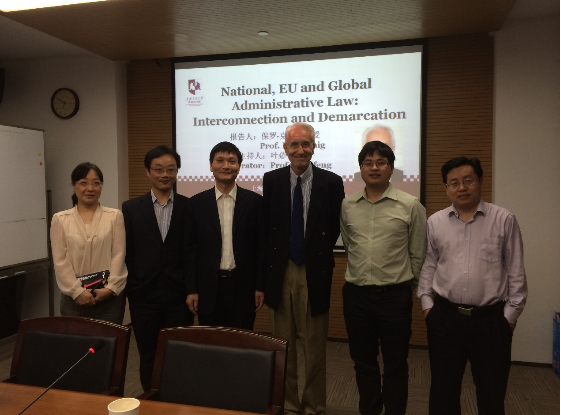

Mr. Paul Craig, a famous professor at Oxford University and also a prominent public law scholar, gave a lecture titled "National, EU and Global Administrative Law: Interconnection and Demarcation" in the evening of May 24, 2015 at the KoGuan School of Law, Shanghai Jiao Tong University. The lecture was presided over by Professor Ye Bifeng, and Professor Guo Yanjun, Professor Zheng Ge, Associate Professor Wang Bin, Associate Professor He Yuan, some doctoral students and postgraduate students of our law school attended this lecture.

The report expanded on mainly around Professor Craig's latest book, "National, EU and Global Administrative Law: Foundations and Challenges", which will be published at Cambridge University Press. The content was divided into two parts, the first part talked about three different systems of the United Kingdom, EU and Global Administrative Law. The second dealt with the three challenges caused by the interconnections of these three different systems of Administrative Law. The United Kingdom is one of the 28 EU member States, so the system of Administrative Law inevitably links with the EU Law, EU Administrative Law, Global Legislation and Global Administrative Law. The British Administrative Law has a history of more than 400 years, which has been developed through court rulings, such as judicial reviews of laws, facts, hearings and discretionary capacity. The EU law not only has a great influence on Britain, but also establishes a unified EU through negative coordination and positive coordination. The subjects of judicial reviews in EU include lack of authority, violation of the main procedures, application of legal errors and abuse of power. At the same time, the European Court developed some hearings, proportional principles, legal certainty, reasonable expectations, the protection of basic rights and other basic and general principles from the national law of Member States to control the legality of EU administrative decisions. These principles were used to explain the EU law, conduct judicial review, and bind the behaviors of Member States under the EU Law. With international organizations making rules in different forms at the global level, such as the World Currency organization, the International Monetary Fund and the World Bank, a few scholars have focused on global administrative law since the 1990s, trying to apply the principles of administrative law to international organizations. One of the challenges of the interconnection of administrative law systems relates to the effectiveness of administration, and the challenge is how to coordinate the 28 member states of the EU to ensure their proper application of the law and judicial review; the second one is how to deal with the legality of conflict between national law and EU and Global Administrative Law; the third challenge is particularly urgent, because it involves the EU and Global Administrative Law invading the legal order of the country and how should the national courts protect their own values and identities. After the report, the students of law school actively asked questions.
The event was jointly organized by KoGuan School of Law of Shanghai Jiao Tong University and the Administrative Law Studies Institution of Shanghai Law Society.

© 2018 KOGUAN SCHOOL OF LAW,SHANGHAI JIAO TONG UNIVERSITY, ALL RIGHTS RESERVED 沪ICP:2010823